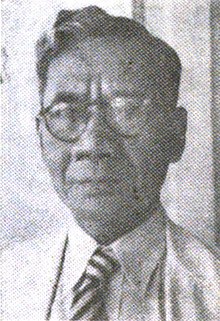Margono Djojohadikusumo
Margono Djojohadikusumo | |
|---|---|
 Djojohadikusumo, c. 1952 | |
| President of Bank Negara Indonesia | |
| In office 1946–1953 | |
| Preceded by | Position created |
| Succeeded by | Abdoel Kareem Pringgodigdo |
| Chairman of the Supreme Advisory Council | |
| In office 25 September 1945 – 6 November 1945 | |
| Preceded by | Position created |
| Succeeded by | Wiranatakusumah V |
| Personal details | |
| Born | 16 May 1894 Banyumas, Dutch East Indies |
| Died | 25 July 1978 (aged 84) Jakarta, Indonesia |
| Children | Sumitro Djojohadikusumo |
Raden Mas Margono Djojohadikusumo (16 May 1894 – 25 July 1978) was an Indonesian politician and banker. He was the founder and the first president of Bank Negara Indonesia, and was also a member of the Investigating Committee for Preparatory Work for Independence.
Early life and education[edit]
Margono was born on 16 May 1894 in Banyumas. His father was part of the Javanese aristocracy, and served in the colonial civil service's district government and in its courts. The family was descended from a nobleman who had fought against the Dutch during the Java War.[1] Margono described his family as "impoverished" aristocracy, and noted that while he was the sixth child, all his elder siblings died as children.[2]: 376 According to Margono, he never visited his ancestor's grave as the latter had disavowed any of his descendants who worked for the Dutch. He began studying at an Europeesche Lagere School (colonial elementary school) in 1901, and after graduating in 1907 he continued his studies at an Opleiding School Voor Inlandsche Ambtenaren (OSVIA; civil servant school for native Indonesians) in Magelang until 1911.[1]
Career[edit]
After graduating from OSVIA, Margono became a civil servant within the police department.[1] He then joined the Dutch People's Credit Service (Volkscredietwezen) in 1917, taking a course in Batavia to become an adjutant inspector in 1921. He was assigned to Madiun and Malang before being placed as an inspector in Batavia by 1927.[3][4] While working at the credit agency, Margono was for a time assigned to Europe at the Ministry of the Colonies in Den Haag between 1937 and 1938. Margono attended the Co-operative Congress in 1938 as part of this assignment, representing the Dutch East Indies. During the Japanese occupation, Margono worked in the occupation government's interior ministry, within its co-operatives department. He was also appointed into the Investigating Committee for Preparatory Work for Independence.[1]
Following the proclamation of Indonesian independence, Margono was appointed as Chairman of the Supreme Advisory Council on 25 September 1945 until he resigned two months later.[5] Wanting to form an Indonesian national bank, Margono initially approached Deputy Finance Minister Surachman Tjokroadisurjo with a proposal to form one. However, Tjokroadisurjo turned him down, preferring to nationalize the colonial central bank De Javasche Bank instead of creating a new bank. Margono then went to Vice President Mohammad Hatta, who approved and signed off on his proposal.[6] Margono then travelled to cities in Java to raise funding for the new bank, and also secured money from a public fund supporting Indonesian independence. He recruited staff for the new bank, and established a location in Jakarta before relocating to Yogyakarta due to increased Dutch presence in Jakarta. The bank was chartered as Bank Negara Indonesia (BNI) on 5 July 1946, Margono becoming its first president.[6]
Margono was briefly imprisoned by Dutch forces following Operation Kraai in 1948.[1] After his release, he participated as part of the Indonesian delegation in the Dutch–Indonesian Round Table Conference until he was replaced by his son Sumitro Djojohadikusumo.[7] Within independent Indonesia, Margono was appointed into the Provisional People's Representative Council as a member of the Great Indonesia Party.[3] He also served as president of the State Industrial Bank since its founding in 1951 until he was replaced as president of both BNI and the industrial bank in October 1953.[8]
Later life[edit]
Due to Sumitro's involvement in the Revolutionary Government of the Republic of Indonesia, Margono was forced into exile abroad along with the rest of his family,[8] only returning after the fall of Sukarno in 1966.[9] He published his memoir, titled Reminiscences from 3 Historical Periods: A Family Tradition Put in Writing, in 1973.[2]: 376 The memoir was dedicated to two of his sons, Subianto and Sujono, who were killed in the Lengkong incident in 1946.[10] His older daughter, Sukartini Djojohadikusumo, was born in 1919 and became an Indonesian centenarian in 2019.[11] Margono died in Jakarta on 25 July 1978, and was later buried at the Djojohadikusumo family grave in Banyumas Regency.[12]
References[edit]
- ^ a b c d e Tokoh-tokoh Badan Penyelidik Usaha-Usaha Persiapan Kemerdekaan Indonesia (in Indonesian). Departemen Pendidikan dan Kebudayaan, Direktorat Sejarah dan Nilai Tradisional, Proyek Inventarisasi dan Dokumentasi Sejarah Nasional. 1993. pp. 75–77.
- ^ a b Purdey, Jemma (September 2016). "Narratives to power: The case of the Djojohadikusumo family dynasty over four generations". South East Asia Research. 24 (3): 369–385. doi:10.1177/0967828X16659728. S2CID 151698429.
- ^ a b Kami perkenalkan (in Indonesian). Ministry of Information. 1952. p. 86.
- ^ Purdey 2016, p. 373.
- ^ Ahsan, Ivan Aulia (14 July 2019). "Sejarah Dewan Pertimbangan Agung: Nasihatnya Kerap Diabaikan". tirto.id (in Indonesian). Retrieved 2 August 2022.
- ^ a b "Sejarah Awal BNI". Historia (in Indonesian). 19 February 2022. Retrieved 2 August 2022.
- ^ Insaniwati, Iin Nur (2002). Mohamad Roem: karier politik dan perjuangannya, 1924-1968 (in Indonesian). IndonesiaTera. p. 92. ISBN 978-979-9375-51-3.
- ^ a b Anwar, Rosihan (2002). In memoriam: mengenang yang wafat (in Indonesian). Penerbit Buku Kompas. p. 173. ISBN 978-979-709-029-6.
- ^ Ahsan, Ivan Aulia (30 May 2018). "Jatuh Bangun Dinasti Djojohadikusumo dalam Politik Indonesia". tirto.id (in Indonesian). Retrieved 2 August 2022.
- ^ Purdey 2016, p. 381.
- ^ Erwanti, Marlinda Oktavia. "Prabowo Kunjungi Adik Sang Ayah, Sukartini Djojohadikusumo". detiknews (in Indonesian). Retrieved 2023-06-10.
- ^ Tempo (in Indonesian). Vol. 8. Badan Usaha Jaya Press Jajasan Jaya Raya. 1978. p. 14.
